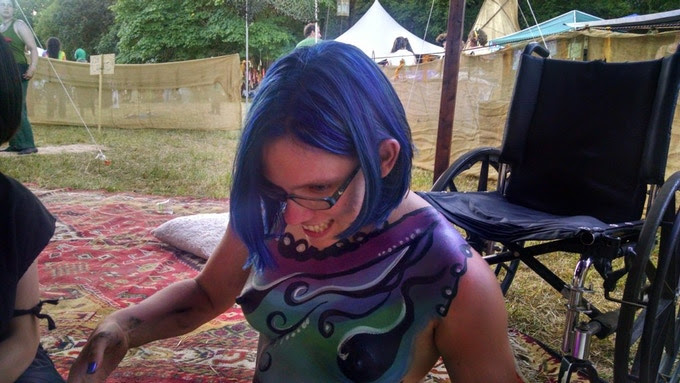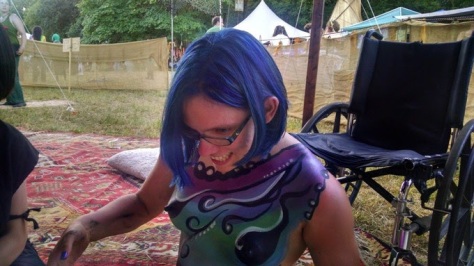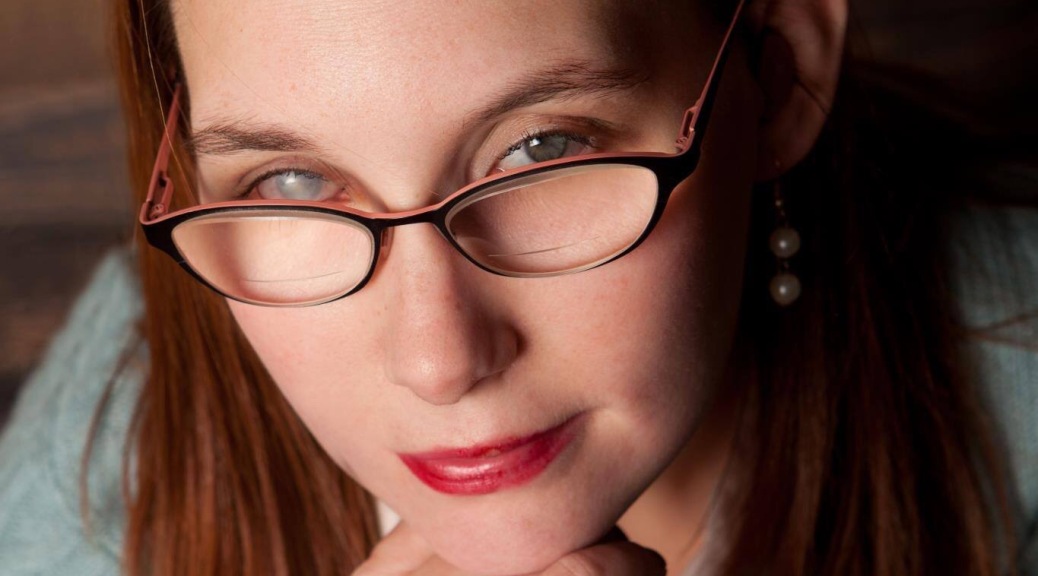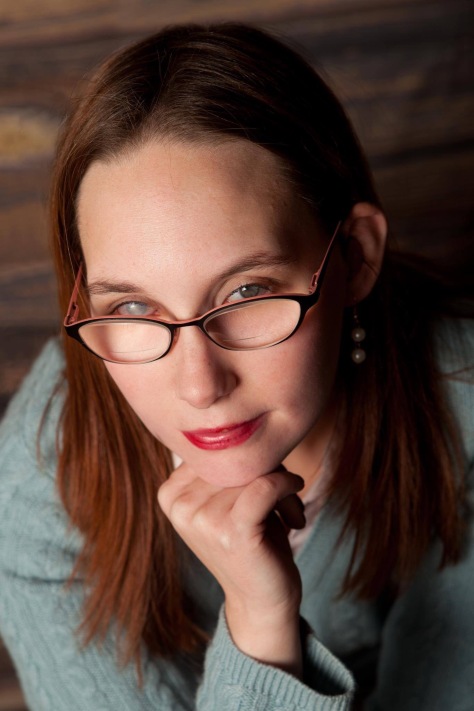By Derek Newman-Stille
Today, I had the opportunity to interview an author and editor whose work I love and respect. I am excited that Dominik Parisien is going to be the Fiction Editor-in-Chief for Uncanny Magazine’s latest in their People Destroy series, Disabled People Destroy Science Fiction. This is an exciting new collection of SF that brings out the voices of disabled people.
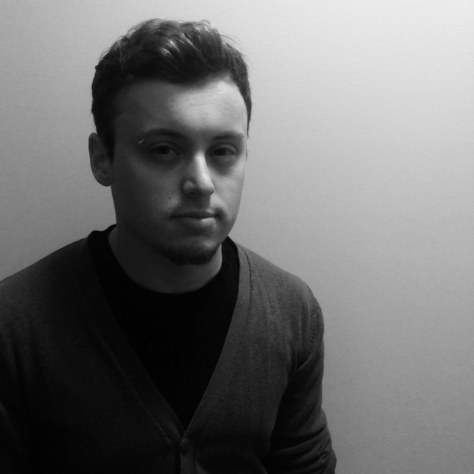
Q: To begin our interview, could you tell us a little bit about yourself?
Dominik Parisien: Hi! My name is Dominik Parisien, and I am an editor, a writer, and an occasional poet. As my name might indicate, I’m a francophone. I’ve lived in Toronto for four years now, and prior to that I lived in Montreal, but I grew up in a small town called Rockland in Eastern Ontario. I co-edited the Shirley Jackson Award-winning anthology The Starlit Wood: New Fairy Tales with Navah Wolfe, along with two other forthcoming anthologies from Saga Press. I also edited Clockwork Canada: Steampunk Fiction. My work has appeared in a variety of magazines and anthologies.
Q: How do you identify with disability?
Dominik Parisien: I have chronic daily headaches, insomnia, and migraines. I also frequently lose consciousness and I experience seizure-like episodes where I collapse and convulse violently. I’ve been experiencing these things since I was in my early teens, and I’m coming up on thirty now. It’s been a long and pretty complicated journey for my identity.
Q: When did you first come to identify yourself as a disabled person?
Dominik Parisien: About three years ago, I think. I started collapsing as a teen, and I was constantly in the hospital and undergoing a number of treatments, but I refused to be identified that way at the time. My understanding of the term was very narrow, essentially limiting it to disabilities related to mobility, because it had only ever been presented that way. Additionally, in my hometown it wasn’t a word you heard a lot, it wasn’t really discussed, and it carried a certain stigma. In my eyes I wasn’t disabled, I just had a serious medical condition – I didn’t understand that those could be the same thing.
Q: In what ways have you connected with the disabled community and how have these connections shaped your identity?
Dominik Parisien: When I started university I became exposed to disability theory, and to more resources on disability in general. The first time I ever made a real connection was with my councillor and other students at the university’s Access Services. For my comfort, and in order to avoid disruptions for other students, I always took my final exams in a separate room, in case I collapsed. At first I was unhappy with the arrangement, because it felt like I was being treated differently, but eventually I learned to see it for what it was: an accommodation. I’ve never liked having people watch over me with my condition, and folks do get clearly nervous when I’m visibly in pain and look like I’m about to collapse, but through discussion with some of the others students in Access Services I learned to modify my outlook, and to change how I interpreted disability in general. You don’t always need help – and it’s easy to resent people’s assistance when they hover over you constantly – but when I finally started talking to others who needed assistance, it helped. I didn’t feel so alone anymore, and not as frustrated, because I now knew others who could relate to my experience.
One of my biggest and most important connections in the disabled community was you, actually. You may recall that when we first met years ago I was still reluctant to identify personally with the term disabled, despite the fact that I was for all intents and purposes a disabled person. Again, it had to do with a very narrow perception of the word. Befriending you and others in the disabled community helped me to expand my understanding of myself, and of how society treats disabled people. I was much more private about my disability at the time. Eventually I learned that if I, as a disabled person, did not speak to my experience, and did not fight for others like me, then people would continue to look upon disability in narrow and problematic ways.

Q: Chronic pain is something that people often ignore when they think about disability because it is not easily visible by the average passer-by. What is the experience of ‘invisible disability’ like for you? What kinds of assumptions do people make about you?
“Invisible disability” was one of my biggest impediments to my self-identification. When I do collapse it becomes very obvious that I have a disability, but the rest of the time people tend not to register it. I do have tells indicating my pain levels, but most don’t know them so they often assume I just look tired, or that I’m on drugs or have been drinking, if they notice anything at all.
The most common response to being told I’m disabled is the standard, “But you don’t look sick!” Again, it’s that perception that disability encompasses only visible conditions. So, there’s usually some surprise or confusion when I tell people I can’t drive, or can’t participate in certain activities. However, most disabled people I’ve told have not expressed surprise in that way, at least not openly.
Q: What do you feel it means to have Disabled Pride?
Dominik Parisien: To not feel shame for how we are. Disability is one of those things that is often treated as socially taboo, sometimes even abhorrent. People often treat disabled bodies as undesirable, as sexless, as disgusting, as deserving of pity rather than respect. To me, disabled pride means believing and proclaiming “No, we deserve the same dignity you afford yourself and others.” And having the absolute right to decry situations in which that isn’t the case.
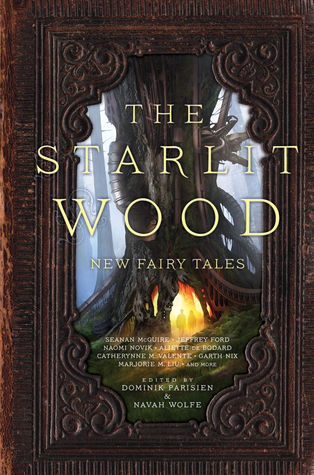
Q: You experience Alice in Wonderland Syndrome. Could you tell us a little bit about that experience?
Dominik Parisien: It’s the experience of the weird. Alice in Wonderland Syndrome, the much less evocative name for it is Todd’s Syndrome, is a neurological condition that affects perception. Basically it makes you feel like you’re in Lewis Carrroll’s odd little book. It appears more commonly in children, but occasionally also in adults. How it works is that your brain alters your perception, essentially making you feel like you are incredibly small, or incredibly large, and it alters the size of objects, people, and landscapes around you. It can also affect the speed at which you perceive information. I wrote about my experience of it in some detail in an essay published by Uncanny Magazine: http://uncannymagazine.com/article/growing-up-in-wonderland/ It is a way very strange way of perceiving the world. It can be frightful, disorienting, very uncomfortable, but also fascinating.
Q: You are currently one of the editors for Disabled People Destroy Science Fiction. Could you tell us a bit about the collection and what you are hoping to see come from it?
Dominik Parisien: Disabled People Destroy Science Fiction is the latest project in the Destroy series, which was started by Lightspeed Magazine. So far there have been Destroy projects for Women, Queers, and People of Colour in that order (for SF, Fantasy, and Horror). Each project has focused on an underrepresented group in genre, and has featured fiction, personal essays, and other non-fiction. For Disabled People we’re also including poetry. The project is being funded as part of Uncanny Magazine‘s Year 4 Kickstarter, and we’ve already reached funding for a double issue – now we’re waiting to see if we get sufficient funding for print copies. The Kickstarter is still running, and you can find it here: https://www.kickstarter.com/projects/lynnemthomas/disabled-people-destroy-science-fiction-uncanny-ma
Once we open to submission – in January 2018 – we’ll be looking for fiction, non-fiction, and poetry from disabled creators. We’re looking for a wide range of work. Basically, we want to create an opportunity for disabled writers to tell their stories and to foster discussion about disability. I’m the Fiction Editor-in-Chief, so I’ll be handling fiction for the issue. I’m encouraging people to write stories about disability, that feature disabled characters, but that isn’t a requirement – first and foremost we want work from disabled writers.
Q: In what ways has science fiction in the past done a disservice to disabled people?
Dominik Parisien: Science fiction in particular has frequently erased disabled people. I know you’ve personally come across the standard discussion on this, where a science fiction author is questioned about the lack of disabled characters in their world and they respond, often defensively or even angrily, that the technology would exist to cure those conditions so they don’t exist in their world. That’s a common scenario. Or, if a disabled character does exist, it’s exclusively as part of a cure narrative – that science has solved the “problem” of their disability. There’s a regular imaginative failure in science fiction in particular to conceive of the place of disabled people in the future and how different technologies could affect them. The notion this reinforces is that disabled people don’t belong in science fiction. In fact, I’ve seen panels where audience members have outright said that disabled bodies don’t belong in space, because they couldn’t adapt properly – that they’re simply undesirable. Those sort of beliefs exist because people rarely if ever encounter scenarios in which a disabled person is featured, and because of an underlying lack of understanding of disability.
Q: What are some of the problematic tropes of disability you have observed?
Dominik Parisien: The cure narrative is one of the most problematic trope in my opinion, at least in terms of science fiction. Technology is integral to most science fiction, and our popular belief about technology is that it helps improve us, our abilities, and solves many of our problems. Naturally, many writers apply this to disability and view technology as the solution to most if not all disabilities. Cure narratives are some of the most harmful scenarios in science fiction. For one, they reinforce notions that a disabled body must necessarily be ‘fixed’ in order for an individual to be ‘normal’. Another major problem is that they don’t consider the implications of their ‘solution’. There are rarely consequences to a cure narrative – we usually don’t see the toll such a change could take on a disabled person, how it could affect how they view themselves and the world around them, how it might affect their interactions with their family, the complications that might ensue (bodily, hormonal, chemical, psychological). Usually the cure is the goal, the end-point of such narratives. It completely denies the human experience of such things.
Disability as a super power is another common and problematic trope. These usually accompany trauma, because for many people who are not disabled themselves it is very difficult to consider “losing” something (mobility, visibility, emotional control, etc) without gaining something in exchange. Superheroes really do love their “whatever doesn’t kill you only makes you stronger” narratives.
The blind psychic is a typical one, but it tends to appear more in fantasy or science fantasy. The “bitter cripple” commonly appears across genres.
There’s also a terribly frustrating tendency for disabled characters, especially mentors, to die in order to provide a lesson to the hero, or to allow them to continue their journey.
Those are just some standard examples. Of course it doesn’t mean they can’t be done at all, or never done well (though frequently they aren’t), but what often happens is that writers want to explore disability without disabled people – they go off their own experience and imagine what it would be like, or they base themselves on other scenarios they’ve encountered in media (almost always created by other people who are not disabled themselves). They don’t consider if those representations are harmful, and if they are they don’t consider the ways in which they’re harmful. The exclusion of real experience by disabled people, the undervaluing of their actual lives and experience in favour of narrative convenience or expediency, is dangerous because many authors end up reinforcing misconceptions and problematic representations.
Q: What positive things can SF do for the representation of disabled people?
Dominik Parisien: I think that exploring the narratives of disabled people in science fiction is particularly important because it allows us to speculate on the future and what it might look like. That obviously isn’t a novel idea, it’s a large part of what science fiction is about after all, but I mean it in practical terms. We love to explore technology and speculate about it, but usually that future isn’t about disabled people. By actively showcasing disabled characters, and considering issues of disability in those futures, we can help the people developing current or future technology to consider how these things might affect a variety of bodies, a variety of minds and abilities. If we look to these things now, then we might avoid potential pitfalls or exclusionary developments later.
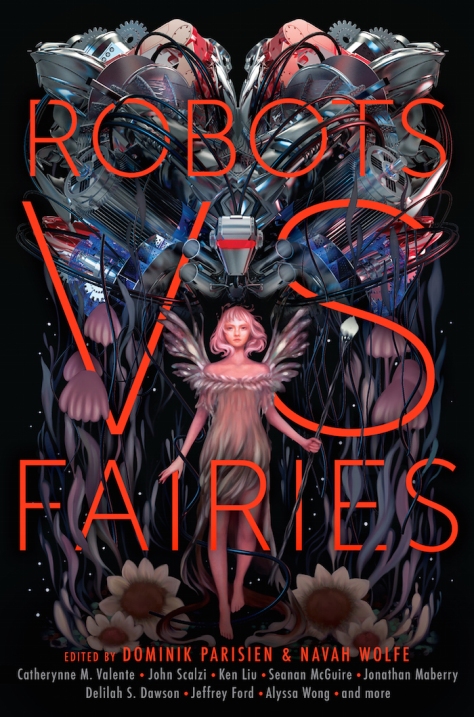
Q: What SF works have done a good job of exploring disability?
Dominik Parisien: I always find this question tricky, because what one person considers accurate and fair may not work for another, largely because our experiences/socializing/background are different. I had a blind classmate in university who loved Star Trek: The Next Generation, and who was especially fond of the character of Geordie Laforge. We often discussed TNG, and although she was frequently frustrated by how some of the story elements handled Geordie, she was also thrilled that he was part of the crew, and he was the first disabled character she encountered in a popular franchise (which seems to also be the experience of many SF fans). On the other hand, I know others who view Geordie as a major problem because they perceive him as a typical cure narrative. I think a character or book/story can certainly be problematic and important at the same time.
Louis McMaster Bujold’s Vorkosigan Saga is an example many consider good. Miles Vorkosigan has a form of dwarfism that leaves him prone to injury, and this isn’t treated like a minor detail to be brushed off throughout the narrative.
Although it isn’t often discussed from this angle, Octavia E Butler’s Parable books (Parable of the Sower, Parable of the Talents) are important to me in how they handle disability. The main character experiences hyper-empathy – she genuinely feels the pain of others – which can make her vulnerable. She lives in a cutthroat world, and she’s forced to hide her disability from most people. There are cultural and social situations in which disabled people either decide not to share their disability, or feel they are forced to do so for a variety of reasons. I wouldn’t call this aspect of Butler’s books necessarily positive, but I do think they ring true and provide real insight into some of the fears disabled people can have.
While it isn’t SF, I do want to mention Mishell Baker’s Borderline, which explores disability in some powerful ways. Mishell, like her main character, has Borderline Personality Disorder, and this features prominently in the book.
Q: How do you incorporate disability into your own writing?
Dominik Parisien: I have a particular interest in exploring ageing and disability in my fiction, and much of my recent work has focused on one or both. In particular, I’ve recently been exploring interactions between the elderly and disabled youth. I’ve done a lot of work with the elderly over the years, and I’m very interested in telling their stories. Alzheimer’s is one of my key interests, and I’ve addressed it in several works, most notably my poem “Sandbags”, which was published by Strange Horizons, and my story “Goodbye is a Mouthful of Water” in the anthology Those Who Make Us: Canadian Creature, Myth, and Monster Stories.
Dominik Parisien is the co-editor, with Navah Wolfe, of the forthcoming Robots vs Fairies, and The Starlit Wood: New Fairy Tales, which won the Shirley Jackson Award and is a finalist for the World Fantasy Award, the British Fantasy Award, and the Locus. He also edited the Aurora Award-nominated Clockwork Canada: Steampunk Fiction. His fiction, poetry, and essays have appeared in Uncanny Magazine, Strange Horizons, ELQ/Exile: The Literary Quarterly, Those Who Make Us: Canadian Creature, Myth, and Monster Stories, as well as other magazines and anthologies. His fiction has twice been nominated for the Sunburst Award. He is a disabled, French Canadian living in Toronto.


